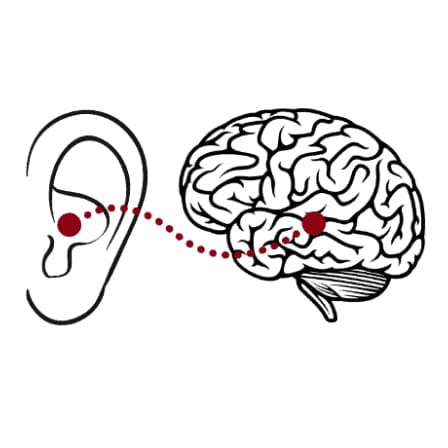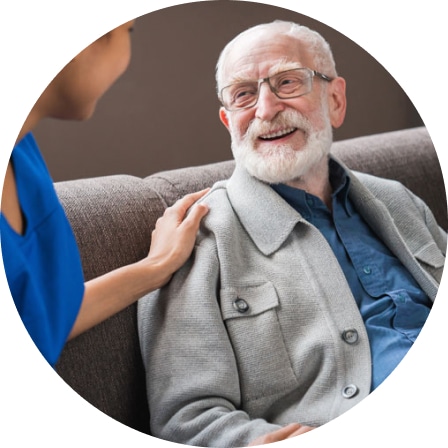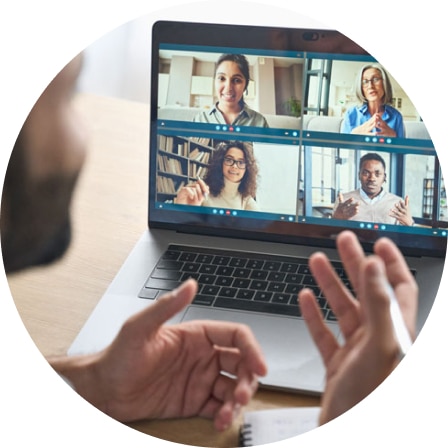What is Auditory Training?
The professionals at Speech & Hearing Associates (SHA) have developed a unique individualized program of strategies and exercises to maximize communication for individuals with hearing loss. We work on skills that are patient and family-centered. Each session is run jointly by a speech-language pathologist and audiologist.
Research shows that individuals who participate in auditory training programs report:
- Higher satisfaction with their hearing aids.
- Improved problem-solving in difficult listening situations.
- Improved quality of life.
- Fewer troubleshooting visits with their audiologist.


Is Auditory Training Right for Me?
If you experience any of the following, auditory training may be right for you:
- Do you hear but not understand?
- Do you struggle to remember what someone just said to you?
- Do you have trouble ‘keeping up’ or think others talk too fast?
- Do you find group conversations difficult?
- Do you struggle in background noise?
How Will I Benefit from Auditory Training?
Through auditory training programs and rehabilitation, we set goals and teach compensatory strategies to:
- Understand and educate others about your hearing loss and listening needs.
- Increase the ability to process, understand, and recall rapid speech.
- Improve speech understanding in noise or other challenging listening environments.
- Learn or improve lip-reading skills.
- Assess difficult listening situations and modify environments for better communication.
- Develop strategies with family members to make communication easier.


How Do I Get Started?
First, contact us to discuss your hearing challenges with your audiologist who will determine if you are an appropriate candidate for auditory training. Then we will schedule an evaluation with a speech-language pathologist who will work in collaboration with your referring audiologist.
SHA offers options for:
- Individual therapy
- Weekly auditory training for small groups
- Monthly class for hard of hearing patients and their communication partners
A Time to Listen & Connect
6-Week Virtual Group
This group meets virtually once per week (for six total weeks), for one hour, with different topics each week. Groups are formed based on similar types of hearing loss and needs.
This program’s sessions are a covered Medicare benefit and covered by most other insurance plans.
Virtual Auditory Training FAQs Enroll Today!A Time to Listen & Connect with Your Communication Partners
A Monthly Class for Hard of Hearing Patients
We offer a one-time, hour-long virtual class in the evenings. This class is casual, interactive and fun! All communication partners are encouraged to join as this class focuses more on communication between family and friends.
Our next class will be offered:
- Dates & Times TBD
- Cost: $100
If you are interested in joining our next class, or would like more information, please call us at (732) 750-4660.

A Time to Listen & Connect
For College-Age or Young Working Adults (Ages 17-25)
This 6-week, virtual class will meet once per week THIS SUMMER for one hour.
- Learn advocacy in the school and work setting.
- Share experiences.
- Improve lip-reading.
- Learn to repair miscommunication.
- Learn how to modify the listening environment.
Classes are covered by most insurances. Secure your spot today by calling (973) 664-6990.
A Time to Listen & Connect
For Individuals with Asymmetrical Hearing Loss
This 6-week, virtual class will meet once per week for one hour.
- Share experiences.
- Learn how to maximize communication.
- Learn how family and friends can help.
- Improve lip-reading.
- Learn to repair miscommunication.
- Learn how to modify the listening environment.
Classes are covered by most insurances. Secure your spot today by calling (973) 664-6990.
Meet Your Team
Laura Norris
Speech-Language Pathologist

Laura Norris earned her Master of Science Degree in Speech-Language Pathology from Towson University and her Bachelor of Science degree in Communication Sciences and Disorders from the Pennsylvania State University. Through her work and internships in various settings including private clinics, skilled nursing facilities, schools, and acute rehabilitation hospitals, Laura has gained experience treating and…
Read MoreMichele McGlynn
Audiologist

Michele McGlynn received her Master’s degree in Audiology from Ithaca College and her Bachelor’s degree in Speech Pathology and Audiology with a Certificate for Teacher for the Speech and Hearing Handicapped from SUNY at Cortland College. Michele has worked over 20 years for Speech & Hearing Associates and her work setting has included hospitals, ENT…
Read More